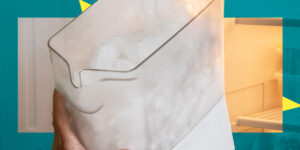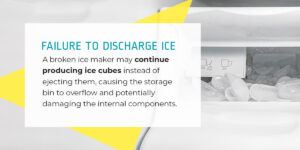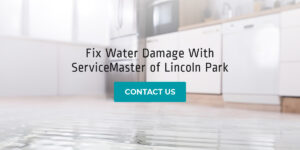
Your refrigerator conveniently preserves food — and if you’re fortunate enough to have a built-in ice maker, you can chill a refreshing beverage anytime with the push of a button. However, a broken or malfunctioning ice maker may leak, causing extensive damage to your kitchen. Fixing the issue can be tricky unless you know where to look. This guide will teach you which parts of your refrigerator may leak, how they work, and how to prevent any faults.
What Causes Refrigerator Malfunctions?
Various factors can affect your refrigerator’s performance and efficiency. Understanding what causes a flooded refrigerator can pinpoint issues early and prevent potential breakdowns, ensuring this appliance continues to operate smoothly and effectively. Here are some things that might go wrong with your refrigerator.
- Clogged water supply line: A fridge’s water supply line controls the water flow to the ice maker and water dispenser. If this component malfunctions, it will cause a leak. You can prevent this issue and the resulting water waste by routinely inspecting your water supply line and keeping it free of blockages.
- Broken defrost drain: The defrost drain in a fridge plays a crucial role in removing excess water that forms during the defrost cycle. The defrost system melts the ice that builds up on the evaporator coils, then channels the water to a pan under the fridge, where it evaporates naturally. If food particles and other debris clog this drain, it will start leaking, eventually leaving large puddles.
- Unreliable door gasket: Your refrigerator and freezer doors have flexible elastic strips that form an airtight seal, keeping cold air inside. Temperature control is these gaskets’ primary function. If the gasket cannot create a proper seal, condensation will drip from your fridge, and the ice in the freezer will melt, flooding your kitchen.
Reasons for Ice Maker Malfunctions
You must quickly pinpoint the problem when your ice maker starts leaking. Modern ice makers have rear intake valves that pump water into cube molds. Then, a refrigeration system freezes the water. Many things could go wrong during this process, resulting in your ice maker leaking water on the floor. Here are some things to look for if this issue happens to you.
- Failure to discharge ice: A broken ice maker may continue producing ice cubes instead of ejecting them, causing the storage bin to overflow and potentially damaging the internal components. If the stray cubes melt, water will leak from the ice maker or storage bin.
- Disconnected lines: Loose plumbing connections can cause water to leak out of the ice maker’s supply line. Check your water lines, valves, and connectors for leaks and replace or tighten them as needed.
- Clogged water supply: A buildup of ice and other materials can block water lines. The resulting high pressure could damage the connection and cause water to drain onto your floor instead of staying in your ice maker. You can avoid this by clearing your water supply line.
- Physical damage: Damaged parts inside your ice maker can make the appliance leak when filling the cube-shaped molds.

Prevention Tips
The secret to preventing refrigerator and ice maker water damage is to take a proactive approach. Regular inspections and maintenance are critical. Follow these tips to keep your kitchen free from water damage and ensure your appliances keep working correctly.
- Routine leak checks: Neglecting fridge maintenance could lead to the perfect conditions for flooding. Regularly inspect all connections, valves and inlets for signs of leaking.
- Monitor the ice fill levels: Check your ice fill levels to prevent overflow. You can adjust the fill levels per the manufacturer’s recommendations to maintain an optimal water supply.
- Clean and defrost regularly: A buildup of food, ice and dirt in your drains, valves and pipes will cause leaks. Clean out and defrost your tray to prevent this from happening. You should also defrost your freezer to remove ice buildup.
- Level the fridge: Water may pool around your refrigerator if it is uneven. Adjust your fridge’s leveling feet to keep your appliance stable and straight.
- Replace damaged parts: Immediately replace damaged or worn parts to avert water damage. The longer you leave problems unattended, the more damage they will do.
- Avoid stagnant water: Stagnant water is a significant threat to your kitchen. It causes structural damage and rot. Your fridge can leak in multiple ways from many different places. Water pooled on your floor can sink through cracks and damage your foundation. Stagnant water is also a breeding ground for harmful bacteria, mold, rodents and insects.
Picking up the Subtle Signs of Water Damage
Sometimes, you can determine your fridge or ice maker has a problem without directly examining it. Knowing the subtle signs of water damage lets you spot an issue even if your appliances seem to work perfectly.
- Water stains: Discolored spots on your walls can indicate water damage. You may have a leak if these patches are close to your refrigerator.
- Warped flooring: Stained, lopsided floors can result from water dripping into the underlayment.
- Peeling wallpaper or paint: Water is one of the most common reasons for paint peeling. Water seeps into wood or drywall and makes the paint separate from the surface. Bubbling or flaking paint indicates water damage.
- Musty smells: An earthy odor in your house might suggest a water problem. These stale smells can emanate from dark, damp and unventilated areas. Mold and mildew thrive on moisture. Besides causing an unpleasant odor, this growth can rot and deteriorate floors, walls and paint.
Fix Water Damage With ServiceMaster of Lincoln Park
At ServiceMaster of Lincoln Park, we do whatever we can to protect your home from water damage. Knowing all the risks to look for is essential for preventing leaks. We provide cleanup and mold removal services to help your home recover from water damage. We promise to do it right or do it over.
Contact us today to fix water damage in your home and learn more about what else we can do for you.


